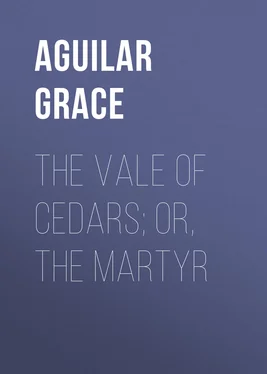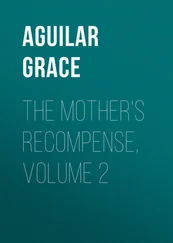Grace Aguilar - The Vale of Cedars; Or, The Martyr
Здесь есть возможность читать онлайн «Grace Aguilar - The Vale of Cedars; Or, The Martyr» — ознакомительный отрывок электронной книги совершенно бесплатно, а после прочтения отрывка купить полную версию. В некоторых случаях можно слушать аудио, скачать через торрент в формате fb2 и присутствует краткое содержание. Жанр: Альтернативная история, foreign_antique, foreign_prose, Исторические приключения, на английском языке. Описание произведения, (предисловие) а так же отзывы посетителей доступны на портале библиотеки ЛибКат.
- Название:The Vale of Cedars; Or, The Martyr
- Автор:
- Жанр:
- Год:неизвестен
- ISBN:нет данных
- Рейтинг книги:3 / 5. Голосов: 1
-
Избранное:Добавить в избранное
- Отзывы:
-
Ваша оценка:
- 60
- 1
- 2
- 3
- 4
- 5
The Vale of Cedars; Or, The Martyr: краткое содержание, описание и аннотация
Предлагаем к чтению аннотацию, описание, краткое содержание или предисловие (зависит от того, что написал сам автор книги «The Vale of Cedars; Or, The Martyr»). Если вы не нашли необходимую информацию о книге — напишите в комментариях, мы постараемся отыскать её.
The Vale of Cedars; Or, The Martyr — читать онлайн ознакомительный отрывок
Ниже представлен текст книги, разбитый по страницам. Система сохранения места последней прочитанной страницы, позволяет с удобством читать онлайн бесплатно книгу «The Vale of Cedars; Or, The Martyr», без необходимости каждый раз заново искать на чём Вы остановились. Поставьте закладку, и сможете в любой момент перейти на страницу, на которой закончили чтение.
Интервал:
Закладка:
Grace Aguilar
The Vale of Cedars; Or, The Martyr
"The wild dove hath her nest—the fox her cave—
Mankind their country—Israel but the grave."
MEMOIR OF GRACE AGUILAR
Grace Aguilar was born at Hackney, June 2nd, 1816. She was the eldest child, and only daughter of Emanuel Aguilar, one of those merchants descended from the Jews of Spain, who, almost within the memory of man, fled from persecution in that country, and sought and found an asylum in England.
The delicate frame and feeble health observable in Grace Aguilar throughout her life, displayed itself from infancy; from the age of three years, she was almost constantly under the care of some physician, and, by their advice, annually spending the summer months by the sea, in the hope of rousing and strengthening a naturally fragile constitution. This want of physical energy was, however, in direct contrast to her mental powers, which developed early, and readily. She learned to read with scarcely any trouble, and when once that knowledge was gained, her answer when asked what she would like for a present, was invariably "A book," which, was read, re-read, and preserved with a care remarkable in so young a child. With the exception of eighteen months passed at school, her mother was her sole instructress, and both parents took equal delight in directing her studies, and facilitating her personal inspection of all that was curious and interesting in the various counties of England to which they resorted for her health.
From the early age of seven she commenced keeping a journal, which was continued with scarce any intermission throughout her life. In 1825 she visited Oxford, Cheltenham, Gloucester, Worcester, Ross, and Bath, and though at that time but nine years old, her father took her to Gloucester and Worcester cathedrals, and also to see a porcelain and pin manufactory, &c., the attention and interest she displayed on these occasions, affording convincing proof that her mind was alive to appreciate and enjoy what was thus presented to her observation. Before she had completed her twelfth year she ventured to try her powers in composition, and wrote a little drama, called Gustavus Vasa, never published, and only here recorded as being the first germ of what was afterwards to become the ruling passion.
In September, 1828, the family went to reside in Devonshire for the health of Mr. Aguilar, and there a strong admiration for the beauties and wonders of nature manifested itself: she constantly collected shells, stones, seaweed, mosses, &c., in her daily rambles; and not satisfied with admiring their beauty, sedulously procured whatever little catechisms or other books on those subjects she could purchase, or borrow, eagerly endeavoring by their study, to increase her knowledge of their nature and properties.
When she had attained the age of fourteen, her father commenced a regular course of instruction for his child, by reading aloud, while she was employed in drawing, needlework, &c. History was selected, that being the study which now most interested her, and the first work chosen was Josephus.
It was while spending a short time at Tavistock, in 1830, that the beauty of the surrounding scenery led her to express her thoughts in verse. Several small pieces soon followed her first essay, and she became extremely fond of this new exercise and enjoyment of her opening powers, yet her mind was so well regulated, that she never permitted herself to indulge in original composition until her duties, and her studies, were all performed.
Grace Aguilar was extremely fond of music; she had learned the piano from infancy, and in 1831 commenced the harp. She sang pleasingly, preferring English songs, and invariably selecting them for the beauty or sentiment of the words; she was also passionately fond of dancing, and her cheerful lively manners in the society of her young friends, would scarcely have led any to imagine how deeply she felt and pondered upon the serious and solemn subjects which afterwards formed the labor of her life. She seemed to enjoy all, to enter into all, but a keen observer would detect the hold that sacred and holy principle ever exercised over her lightest act, and gayest hour. A sense of duty was apparent in the merest trifle, and her following out of the divine command of obedience to parents, was only equalled by the unbounded affection she felt for them. A wish was once expressed by her mother that she should not waltz, and no solicitation could afterwards tempt her. Her mother also required her to read sermons, and study religion and the Bible regularly; this was readily submitted to, first as a task, but afterwards with much delight; for evidence of which we cannot do better than quote her own words in one of her religious works.
"This formed into a habit, and persevered in for a life, would in time, and without labor or weariness, give the comfort and the knowledge that we seek; each year it would become lighter, and more blest, each year we should discover something we knew not before, and in the valley of the shadow of death, feel to our heart's core that the Lord our God is Truth."— Women of Israel , Vol. II, page 43.
Nor did Grace Aguilar only study religion for her own personal observance and profit. She embraced its principles (the principles of all creeds) in a widely extended and truly liberal sense. She carried her practice of its holy and benevolent precepts into every minutiae of her daily life, doing all the good her limited means would allow, finding time, in the midst of her own studies, and most varied and continual occupations, to work for, and instruct her poor neighbors in the country, and while steadily venerating and adhering to her own faith, neither inquiring nor heeding the religious opinions of the needy whom she succored or consoled. To be permitted to help and comfort, she considered a privilege and a pleasure; she left the rest to God; and thus bestowing and receiving blessings and smiles from all who had the opportunity of knowing her, her young life flowed on, in an almost uninterrupted stream of enjoyment, until she had completed her nineteenth year.
Alas! the scene was soon to change, and trials awaited that spirit which, in the midst of sunshine, had so beautifully striven to prepare itself a shelter from the storm. The two brothers of Miss Aguilar, whom she tenderly loved, left the paternal roof to be placed far from their family at school. Her mother's health necessitated a painful and dangerous operation, and from that time for several years, alternate hopes and fears through long and dreary watchings beside the sick bed of that beloved mother, became the portion of her gifted child. But even this depressing and arduous change in the duties of her existence did not suspend her literary pursuits and labors. She profited by all the intervals she could command, and wrote the tale of the "Martyr," the "Spirit of Judaism," and "Israel Defended;" the latter translated from the French, at the earnest request of a friend, and printed only for private circulation. The "Magic Wreath," a little poetical work, and the first our authoress ever published, dedicated to the Right Honorable the Countess of Munster, also appeared about this time.
In the Spring of 1835, Grace Aguilar was attacked with measles, and never afterwards recovered her previous state of health, suffering at intervals with such exhausting feelings of weakness, as to become without any visible disease really alarming.
The medical attendants recommended entire rest of mind and body; she visited the sea, and seemed a little revived, but anxieties were gathering around her horizon, to which it became evidently impossible her ardent and active mind could remain passive or indifferent, and which recalled every feeling, every energy of her impressible nature into action. Her elder brother, who had long chosen music as his profession, was sent to Germany to pursue his studies; the younger determined upon entering the sea service. The excitement of these changes, and the parting with both, was highly injurious to their affectionate sister, and her delight a few months after, at welcoming the sailor boy returned from his first voyage, with all his tales of danger and adventure, and his keen enjoyment of the path of life he had chosen, together with her struggles to do her utmost to share his walks and companionship, contributed yet more to impair her inadequate strength.
Читать дальшеИнтервал:
Закладка:
Похожие книги на «The Vale of Cedars; Or, The Martyr»
Представляем Вашему вниманию похожие книги на «The Vale of Cedars; Or, The Martyr» списком для выбора. Мы отобрали схожую по названию и смыслу литературу в надежде предоставить читателям больше вариантов отыскать новые, интересные, ещё непрочитанные произведения.
Обсуждение, отзывы о книге «The Vale of Cedars; Or, The Martyr» и просто собственные мнения читателей. Оставьте ваши комментарии, напишите, что Вы думаете о произведении, его смысле или главных героях. Укажите что конкретно понравилось, а что нет, и почему Вы так считаете.












